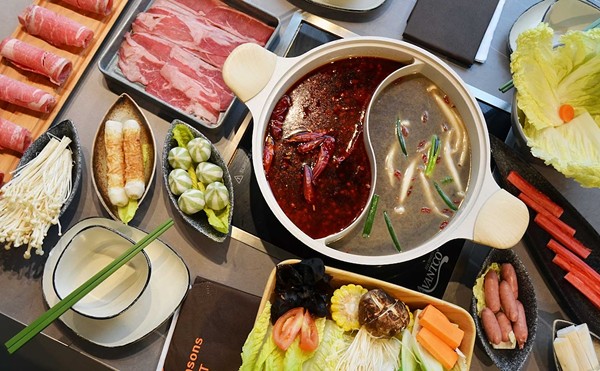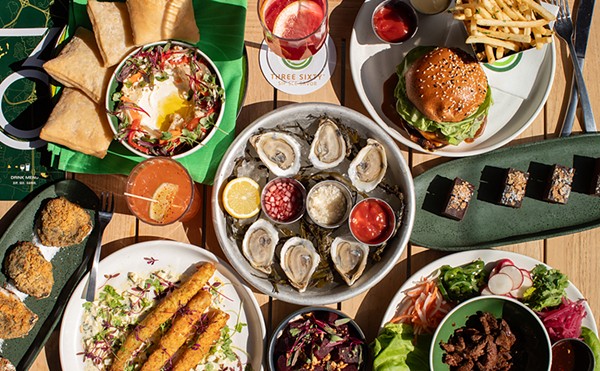During a recent meal at Roux Cajun Café, the theory played itself out in textbook fashion. The old house, once home to the Pond Inn, is cozy, with an upstairs dining area and another dining room around the corner from the bar. In the quaintly decorated front bar area sat three noisy male locals hefting a few too many Bud Lights; the men were, gauging from their boisterous chatter, quite familiar with the area. In the small adjoining dining room, also quaintly decorated with a bayou motif, a well-heeled couple tried to enjoy their expensive meals, flinching each time the rabble rousers busted out a cuss word or raised their voices in a much-too-hard attempt to gain the attention of the lone female barfly. Even though the place was nearly empty, we had time to notice a lot -- from the abovementioned tableau to the handpainted tables and wall decorations to the hanging musical instruments to the good selection of piped-in blues and zydeco -- because we stood around for about ten minutes before being approached by the lone server.
In the dining room adjacent to the bar, a nice mish-mash of mismatched chairs yields a comfortably rustic feel. But between the roustabout trio of Bud Light drinkers and Dolly Parton blaring from the kitchen every time the doors swung open, it was hard to appreciate the setting. Don't get me wrong: I like a good clamorous meal just as much as the next beer swiller. But forking out more than $20 for an entrée alters my expectations. And when you're out of pasta on a Tuesday because you sold out over the weekend and your delivery doesn't arrive until later in the week, why couldn't you just run to the store to tide yourself over till then? Fresh fish I can understand -- but noodles?
A plate of six oysters Rockefeller, though, put me in a better mood. The plump bivalves had been baked to a state of tenderness, with sautéed spinach present but not layered on like a sod roll as with too many other versions of this New Orleans classic. Arranging the half-dozen oysters around a pool of Alfredo sauce was unusual, but not deleterious. But just as we were looking forward to a lemon Caesar salad served in a Parmesan cheese basket, we were informed that Roux was out of Parmesan cheese. Again, not a difficult ingredient to find in a pinch (even in Wildwood). Our waiter did knock off a couple of bucks, which was nice of him. But perhaps they were out of lemon as well -- we couldn't find a hint of it.
When I found out that chef and owner Dave Mason ships his crawfish from Louisiana, there was no question that the crawfish pie entrée was for me. Unlike the standard pie, Mason doesn't enclose his version in biscuit dough like a potpie. This crawfish-rich dish is topped with a long strip of puff pastry, which is in turn topped with three whole mudbugs. Tasty, though I prefer my Cajun pies baked to bubbling under a crisp blanket of dough.
From among several grilled meat entrées, we chose a pepper-crusted filet "topped with apple-smoked bacon served on a blue cheese potato cake and marchan du'vin sauce." Ordered medium-rare, the filet arrived overcooked. The parts that were done medium-rare showed that it was an excellent cut of beef, albeit quite small. We were also surprised to find baby carrots (too mushy) and red beans and rice on the side, when the menu had tempted us with that potato cake. The roux-like sauce (which the French actually call marchands de vin -- translation: "merchants of wine") was rich enough with shallots, beef stock and red wine, but suffered from little globs of flour that had been employed as a thickener. It all seemed rather slapdash, especially when we failed to find any of that apple-smoked bacon atop the $25 main course.
Maybe it was an off night: Mason wasn't in the kitchen, and maybe they really were cleaned out over the weekend. But during a second visit, they were out of fried green tomatoes (doesn't even Dierbergs carry green tomatoes these days?) At least the coconut shrimp appetizer was a success: six monstrous butterflied shrimp fried in a batter made with beer and shredded coconut and plated with a golden sweet-and-sour sauce, parsley confetti and scallions. The whole thing looked like Mardi Gras on a plate.
"For a good gumbo, you have to cook your food for at least four hours. First you start with a roux...." So writes Joan Nathan, in her American Folklife Cookbook. Not many dishes on Roux's menu use the restaurant's namesake, though it is the defining ingredient in Cajun cooking. Like Mexican mole sauces, roux is regional and its texture, color and flavor vary. And like barbecue, nearly every aspect of making a roux is cause for debate. Is a creamy pale roux better than an intensely smoky-flavored, nearly black one? "[I]t is the roux that pulls these dishes together, that gives them coherence and grace," writes author John Thorne in Serious Pig: An American Cook in Search of His Roots. "Especially gumbo, because gumbo contains within itself the entire history of the Cajun diaspora. The roux itself grounds that dish to the France from which the Cajuns originally came." Dave Mason's mother is Cajun and he makes his roux the old-fashioned way, with lard and flour for a rich brown gravy. Mason calls his roux a "Creole stock," but I consider Creole the sophisticated cousin of Cajun cooking. Nonetheless, Roux's seafood gumbo is pungent, thickened with okra as well as roux and flavored with the trinity of Cajun seasonings: green bell pepper, scallions and celery. All well and good, but although crawfish tails were in abundance, I had to search hard for any bits of fish.
Zydeco pasta (penne with shrimp and crab in a lobster cream sauce) and tuna Garibaldi (grilled yellowfin with lump crab meat in a béarnaise sauce) are far from Cajun, and Mason will be the first to say so. The pasta was fine, but at $23 it was certainly overpriced. The tuna seemed more pan-seared than grilled and was so dry that even the béarnaise couldn't breathe life into it. And once again, if there was crab meat on the dish, I hadn't brought the microscope to detect it.
The wine list includes twelve dinner and two dessert offerings by the glass, priced from $5 to $7. By the bottle, those same wines go for $20 to $28. Those occupy the low end of the rest of the list, which boasts a couple of bottles that break $100. For dessert, Roux offers a sweet potato pie, crème brûlée, a tarte Tatin and a Jack Daniel's bread pudding. But we went for the beignets. As in the crawfish pie, Mason uses puff pastry for a lighter and fluffier beignet. To push you over the edge of restraint, he plates a large serving with four scoops of fresh whipped cream and a snowy blanket of powered sugar.
What Roux has going for it is a captive audience with a large capacity for discretionary spending. What it lacks is a reason for the rest of us to venture to the hinterlands, especially if half the menu turns up missing in action. Suddenly, hoisting a beer at the local dive doesn't sound so bad.





